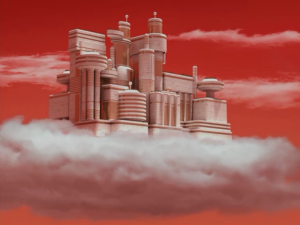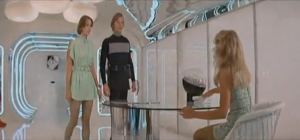4 Signs Your Utopia Might Secretly Be A Dystopia–Friday Four
- October 2nd, 2015
- Posted in Genre Savvy Survival Lists . Lists . Tropes and Writing
- Write comment
 Things are pretty great here in Utopia-land, aren’t they? Everyone’s got enough to eat, and they have plenty of time to relax. The weather’s always good, nothing ever breaks down, the lost Doctor Who episodes have been found and Half-Life 3 is totally coming out next week, you guys. A false utopia? Pshaw. Who could possibly have a problem with such a place?
Things are pretty great here in Utopia-land, aren’t they? Everyone’s got enough to eat, and they have plenty of time to relax. The weather’s always good, nothing ever breaks down, the lost Doctor Who episodes have been found and Half-Life 3 is totally coming out next week, you guys. A false utopia? Pshaw. Who could possibly have a problem with such a place?
Well, maybe you should. Utopia’s not all it’s cracked up to be; a lot of the time, if you stop to think about it, that wonderful place is actually pretty horrifying. Or even if it is, if you have any experience with the real world, you might start to ask yourself questions, like “how did things become so perfect?”–which is often the first step to learning that it’s not so perfect after all. So, if you find yourself in an apparent utopia, it might be time to dust off that deerstalker and magnifying glass and do a little investigating, and these four signs are as good a place to start as any.
4. No One’s Allowed to Leave
Utopias tend to be a little light on immigration, which is pretty confusing from an outside perspective. If this place is so great, why aren’t there millions of people moving in every day? That can be handled easily enough, though; some kind of automated system to keep out intruders who might disrupt the delicate balance that this society depends on. Or maybe this utopia already spans the whole planet. But there’s another side to all this, in the form of people wanting to leave. Utopia can’t please everyone, after all. If our utopia is one of peacefully living in harmony with nature, that kinda puts a cramp in my desire to enjoy high tech gadgets, for example. The opposite could easily be true as well. Perhaps I’ve just got the itch for adventure and want to go out exploring, to see the world beyond the walls of utopia. It could be that deep down, I feel like I don’t deserve a world this good.
In a true utopia, it shouldn’t much matter if someone wants to leave; worst case scenario, I find what’s beyond the walls isn’t so exciting and I’m welcomed back with open arms. But a false utopia? Leaving is a threat to all this somehow. Perhaps utopia’s even more delicate than anyone wants to admit, and even one person leaving can spell disaster. Or it could be designed to keep up the charade; if this false utopia for everyone else is being used, say, to prop up a true utopia for the ruling elite, then anyone who knows about it could be a threat.
Evaluate your society. Are people allowed to come in and join? Are they allowed to leave if they want, or return if they do? How well known is the world beyond utopia to those inside?
3. Sudden Disappearances
So no one’s allowed to leave… but if that’s the case, what happens to all these people who just up and disappear from time to time? Pay attention and you might notice it. Little Billy reached the age for Carousel, decided he didn’t want to participate, and now you’re never going to see him again. Or his curiosity led him somewhere he wasn’t supposed to be and something took care of him as a result. In the worst scenarios, this ends up happening to anyone who even thinks about leaving–any signs that point to potential rebellion, no matter how slim, are squashed instantly. Not very utopian now, is it?
That all sounds pretty overtly sinister, I know, which you might think would instantly disqualify your society from even masquerading as a utopia. But that’s the truly insidious thing here–these excuses for disappearing are often built-in to the society at a level that makes it beyond questioning for the citizens. Carousel is clearly a means of control over the populace to us, but it’s a fact of life in Logan’s Run, as sure for them as it is that the sun will rise in the east. But it can become even more extreme than that, with some “utopias” going beyond cultural influence into straight up mind control. It’s possible people have been disappearing and you can’t even remember they existed.
How often do people go missing? Is there some ritual or mechanism built into society at a basic level that causes people to disappear unexpectedly? If you’re thinking that no one has ever disappeared, how sure are you that that’s really the truth?
2. Uniformity Reigns Supreme
Diversity is something that most people would say is a valuable part of society, but having a lot of different kinds of people, with different upbringings and beliefs can create conflict. People who want to take a shortcut to utopia will often resort to homogenizing the populace to do it. That gets nasty fast, but creating their own version of utopia is the goal of a lot of villains, after all. And If that’s the case, you can see the end result all around you. Maybe everyone’s suspiciously similar, either in looks or behavior. Dissenters might be “disappeared,” as we saw above, or dissent could be rendered impossible, either through technological restraints or mind control of the most sinister varieties. Free will is a threat to the false utopia, so manually limiting the citizens’ options solves that problem pretty quick. This manifests in a number of ways: art is one of the first things to die out, leaving a world that’s devoid of color and with little in the way of individuality.
Of course, things can always get worse… sometimes, this false “utopia” was achieved by purging everyone who was different in the first place. It’s too late to help those people, unfortunately, but the tell-tale signs are present. How well known is the past? Are there many different people present, or is everyone more or less the same? Is reading this article going to land you in trouble with the ones who enforce the laws of this society, be they Sandmen or androids or AI? For that matter, how different are these enforcers?
1. The Dark Secret
At the heart of every fake utopia out there lies a dark secret. As if the mind control and the restraints of freedom and enforced uniformity weren’t bad enough, there’s something worse lurking in the shadows of society. Is your world free of disease? Maybe that’s because there’s a basement full of people suffering from EVERY disease to make up for it. Or your life of luxury runs on resources mined by a lower class suffering constant hardships as a result. It doesn’t matter what it is, really, but odds are that all this good is only possible because of something really bad happening behind the scenes. And for the people behind the scenes who are in charge of utopia, keeping this dark secret hidden is job #1, because its revelation is the only thing that could ruin their perfect society.
You might be thinking by now, “gee, none of these utopias sound very utopian.” In fact, a lot of these movies and episodes I’ve cited are famous dystopias. But to paraphrase an old saying, one man’s utopia is another man’s dystopia, and a real, conflict-free utopia wouldn’t exactly be fun to watch. Utopia’s origins are Greek, and as the word moved into English, it gained a double meaning–“True Place” and “No Place.” The perfect society can never really exist. Utopia cannot be, and if the place you live in looks like it, it’s time to start digging.
If you’re lucky, the society is pretty close, and they’ll respect the individual decision-making capabilities of each resident. The utopia’s dark secret is revealed to everyone who comes of age, and they get to decide if the trade off is worth it. So I guess the only question left in that scenario is… will you walk away from Omelas?
So, have you uncovered the truth of your false utopia? Or would you rather not dig so deep and just be happy with what you have? You can let me know in the comments, or on Twitter @RetroPhaseShift. And if you enjoyed the article, please share it!








well said. definitely glad you included dystopia and the greek translation in the end. so does that mean there are no examples of true utopias (with no downsides) encountered in any scifi media? or it literally cant exist.
I’d say it can’t exist. The Federation in Star Trek is pretty damn good, though, especially life on Earth in particular. But even there, we have Deep Space 9 to shine a light on the dark sides of the Federation. Early TNG in particular is almost too utopian for drama to exist, and that’s part of the reason the first two seasons aren’t very good.
Odds are if you’re watching a story that’s coming across as legitimately utopian, it’s too good to be true in-universe, too, and will turn out to be a simulation or dream.